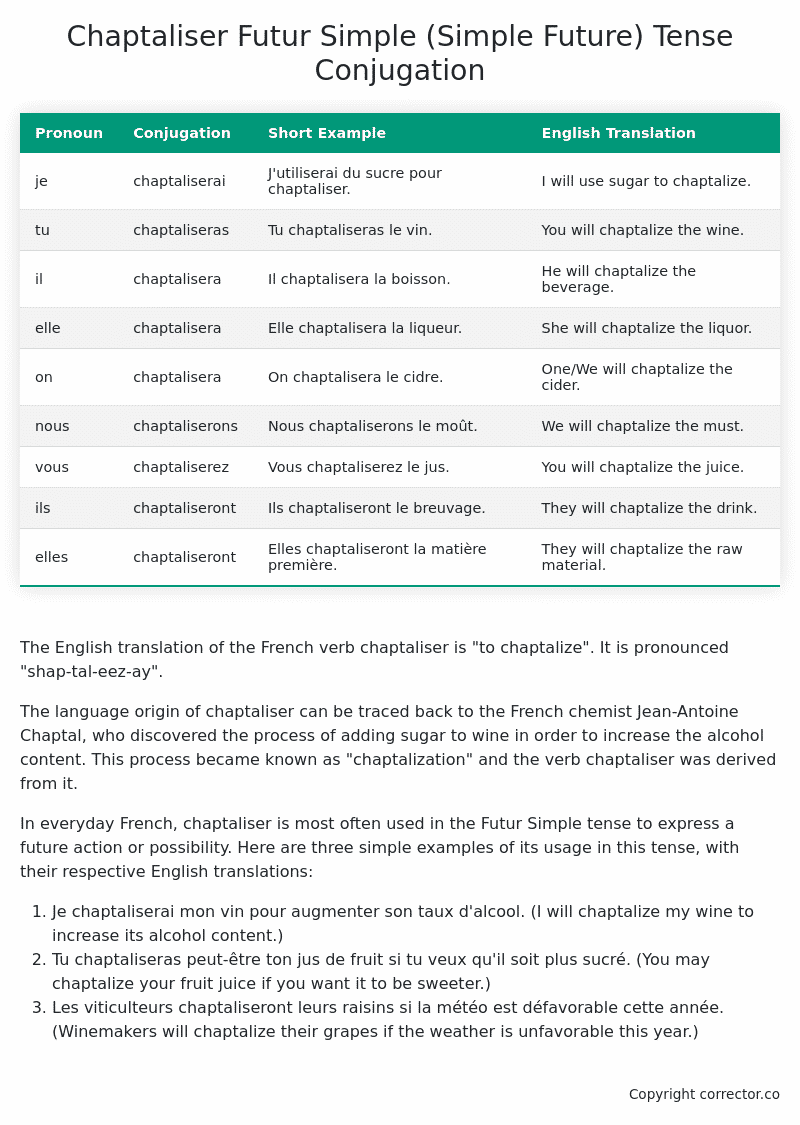Futur Simple (Simple Future) Tense Conjugation of the French Verb chaptaliser
Introduction to the verb chaptaliser
The English translation of the French verb chaptaliser is “to chaptalize”. It is pronounced “shap-tal-eez-ay”.
The language origin of chaptaliser can be traced back to the French chemist Jean-Antoine Chaptal, who discovered the process of adding sugar to wine in order to increase the alcohol content. This process became known as “chaptalization” and the verb chaptaliser was derived from it.
In everyday French, chaptaliser is most often used in the Futur Simple tense to express a future action or possibility. Here are three simple examples of its usage in this tense, with their respective English translations:
- Je chaptaliserai mon vin pour augmenter son taux d’alcool. (I will chaptalize my wine to increase its alcohol content.)
- Tu chaptaliseras peut-être ton jus de fruit si tu veux qu’il soit plus sucré. (You may chaptalize your fruit juice if you want it to be sweeter.)
- Les viticulteurs chaptaliseront leurs raisins si la météo est défavorable cette année. (Winemakers will chaptalize their grapes if the weather is unfavorable this year.)
Table of the Futur Simple (Simple Future) Tense Conjugation of chaptaliser
| Pronoun | Conjugation | Short Example | English Translation |
|---|---|---|---|
| je | chaptaliserai | J’utiliserai du sucre pour chaptaliser. | I will use sugar to chaptalize. |
| tu | chaptaliseras | Tu chaptaliseras le vin. | You will chaptalize the wine. |
| il | chaptalisera | Il chaptalisera la boisson. | He will chaptalize the beverage. |
| elle | chaptalisera | Elle chaptalisera la liqueur. | She will chaptalize the liquor. |
| on | chaptalisera | On chaptalisera le cidre. | One/We will chaptalize the cider. |
| nous | chaptaliserons | Nous chaptaliserons le moût. | We will chaptalize the must. |
| vous | chaptaliserez | Vous chaptaliserez le jus. | You will chaptalize the juice. |
| ils | chaptaliseront | Ils chaptaliseront le breuvage. | They will chaptalize the drink. |
| elles | chaptaliseront | Elles chaptaliseront la matière première. | They will chaptalize the raw material. |
Other Conjugations for Chaptaliser.
Le Present (Present Tense) Conjugation of the French Verb chaptaliser
Imparfait (Imperfect) Tense Conjugation of the French Verb chaptaliser
Passé Simple (Simple Past) Tense Conjugation of the French Verb chaptaliser
Passé Composé (Present Perfect) Tense Conjugation of the French Verb chaptaliser
Futur Simple (Simple Future) Tense Conjugation of the French Verb chaptaliser (this article)
Futur Proche (Near Future) Tense Conjugation of the French Verb chaptaliser
Plus-que-parfait (Pluperfect) Tense Conjugation of the French Verb chaptaliser
Passé Antérieur (Past Anterior) Tense Conjugation of the French Verb chaptaliser
Futur Antérieur (Future Anterior) Tense Conjugation of the French Verb chaptaliser
Subjonctif Présent (Subjunctive Present) Tense Conjugation of the French Verb chaptaliser
Subjonctif Passé (Subjunctive Past) Tense Conjugation of the French Verb chaptaliser
Subjonctif Imparfait (Subjunctive Imperfect) Tense Conjugation of the French Verb chaptaliser
Conditionnel Présent (Conditional Present) Tense Conjugation of the French Verb chaptaliser
Conditionnel Passé (Conditional Past) Tense Conjugation of the French Verb chaptaliser
L’impératif Présent (Imperative Present) Tense Conjugation of the French Verb chaptaliser
L’infinitif Présent (Infinitive Present) Tense Conjugation of the French Verb chaptaliser
Struggling with French verbs or the language in general? Why not use our free French Grammar Checker – no registration required!
Get a FREE Download Study Sheet of this Conjugation 🔥
Simply right click the image below, click “save image” and get your free reference for the chaptaliser Futur Simple tense conjugation!

Chaptaliser – About the French Futur Simple (Simple Future) Tense
Formation of Futur Simple
For regular -er verbs (e.g., parler – to speak)
For regular -ir verbs (e.g., finir – to finish)
For regular -re verbs (e.g., vendre – to sell)
Common Everyday Usage Patterns
Conditional Statements
Interactions with Other Tenses
Futur Antérieur
Conditional
Present
Summary
I hope you enjoyed this article on the verb chaptaliser. Still in a learning mood? Check out another TOTALLY random French verb conjugation!


